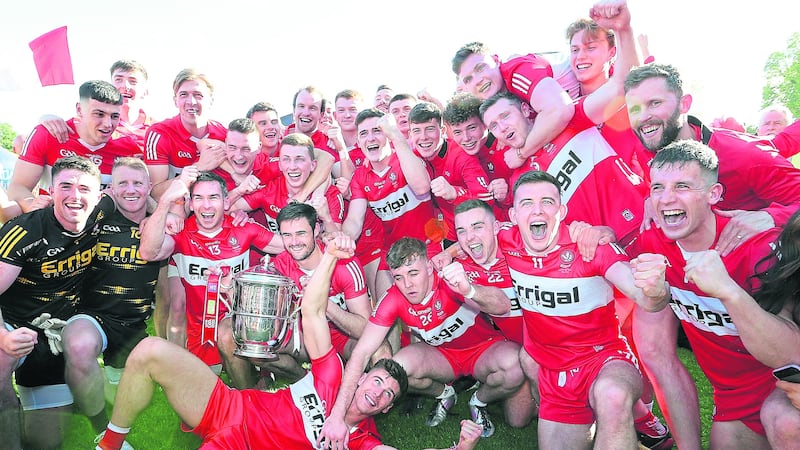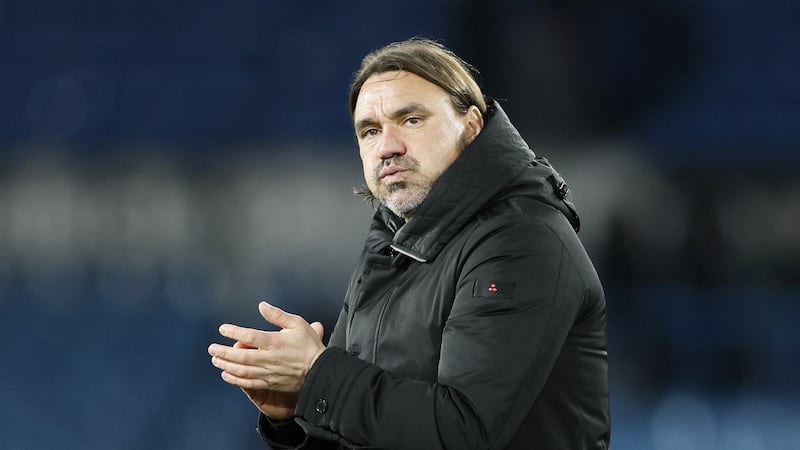DERRY'S victory in last year’s Ulster Championship was a clear signal that this team had arrived.
It showed real progress, gave them silverware and saw them travel south as provincial standard-bearers and genuine contenders for higher honours.
In the past, winning the Ulster Championship usually provided a team critical momentum in challenging for the All-Ireland.
Despite securing a place in the All-Ireland decider in 2010, I always felt we in Down lacked the experience of winning a big final.
Cork, who beat us in that decider, had the experience of beating Kerry in the Munster final, so they knew it could be done.
Had we taken the traditional route of Down’s five All-Ireland-winning sides – via an Ulster Championship win – that experience could have been worth a point or two. What ifs.
Derry may approach this year’s Ulster Championship differently. The bottom line for them is that they have already qualified for the group stages of the Sam Maguire.
Why would you risk burn-out before you get to your main objective? If there is a marginal call over whether someone plays injured or not, surely there is no decision to make.
Monaghan and Tyrone have also qualified, so the Ulster Championship will not mean as much to them either.
It is a real pity that the most competitive football Championship will now become a warm-up event for some counties.
For others it provides a dangling carrot, a means by which they avoid playing Tailteann Cup football.
But we have been calling for Championship restructuring for years and it is finally here.
It was no secret that the provincial councils were fervently opposed to reforming their own competitions, while acknowledging the need to change. I can’t figure that one out, although every proposal I read had its pros and cons.
You can’t please everyone and in the end the provincial councils secured some concessions with it being agreed that provincial finalists would be guaranteed entry to the Sam Maguire competition.
It will take some getting used to and I am sure I will end up misinterpreting the structure until its ingrained for a few seasons – assuming that nothing is changed or replaced in the interim.
I know that GAA president-elect Jarlath Burns is a big supporter of the Ulster Championship and on the occasions we discussed football it was clear how dear he holds his Anglo-Celt medal. I would have loved to have won one myself.
Derry, Donegal, Tyrone, Cavan, Armagh and Monaghan have all won Ulster titles since Down claimed their last in 1994.
For Down manager Conor Laverty, this season’s Ulster championship is his first opportunity to instil an ambition into the current Mourne players.
And believe me, should the Anglo-Celt become resident for a year in the Mournes, that would be a major achievement.
They were in a decent position to secure promotion from Division Three but individual errors cost them at crucial times during their critical games against Cavan and Fermanagh, who beat them to promotion.
Fermanagh are in a similar position to Down in many ways. An Ulster title – something they’ve never won – would be a huge thing for the Ernemen.
Why can’t they win it? Cavan did it three years ago and Fermanagh and Cavan are every bit as good as each other.
Overall, I remain open-minded as to whether the new structure will work.
Having not been in favour of the Tailteann Cup or any such secondary competition, I recognise that Westmeath’s inaugural win last season was fantastic for that group of players and the county. You could see what it meant to the fans.
Tiers work very well at club level and the merit of having this at county level is logical.
History and nostalgia is not enough of a reason to be closed to any and all reform.
If history has taught me anything, however, I suspect the GAA will not be settling on this particular structure.
I have been wrong before. Once I think, but it was many years ago!
The GAA’s popularity actually presents it with a problem.
Inter-county players have now become superstars and David Clifford posters hang on walls next to global names such as LeBron James and Lionel Messi.
The commercial engine of the GAA continues to power ahead, but when a Dr McKenna Cup, National League, provincial Championship, U20 competition, Sam Maguire Cup and Tailteann Cup are fixed for a six-month window, it appears an excessive ask of amateur players.
After that, there is a club season for the remaining months of the summer, stretching into the autumn and winter.
The GAA has a future problem on its hands.
It is expecting too much from amateur players and while the GPA was formerly a foe it is now within the walls of Croke Park.
While the likes of David Clifford and Shane Walsh will always be the better off, the majority of inter-county players aren’t thinking of a sponsored car but rather if they’re going to receive their mileage allowance. There has to be a tipping point.
And as we move towards the integration of the GAA and the governing bodies of female Gaelic games, we see that issues of fairness and equality still need to be addressed.
The dispute between the Cavan ladies’ footballers and the county administration over expenses saw the team pull out of their final league game, while recently a representative of my own county’s ladies’ team told me how they train on a just a third of a field.
We have never been in a better place with very few grounds now not associated with some business and receiving sponsorship.
Yet we only have to examples of unfair treatment of our sisters, girlfriends, wives or mothers to realise someone is falling short somewhere of the right way to do things. It may not be life and death but it is important none the less.







